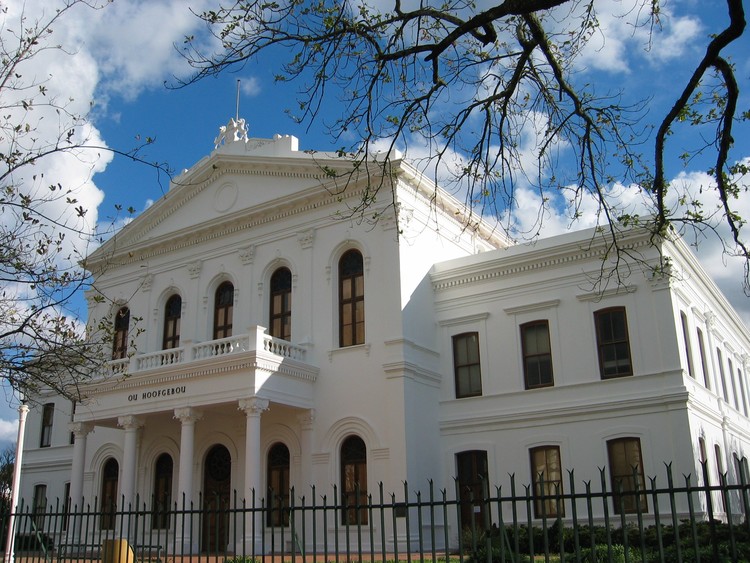Call for Stellenbosch University to take a stand on Gaza
Other universities in South Africa have passed resolutions criticising the war
The Ou Hoofgebou (Former Main Administration building, now the Law Faculty) on Stellenbosch University campus. Photo: Wikipedia user Dfmalan (CC BY 3.0)
A statement, signed by more than 200 members of the Stellenbosch University community, has called on the institution to condemn the crimes being committed by Israel in Gaza.
Unlike several other South African universities, the letter states, Stellenbosch University has been largely silent on this issue.
A motion in the senate calling for an immediate ceasefire and the cessation of attacks on civilians in Gaza and Israel, the passage of humanitarian aid and the return of all captives was defeated on 30 April 2024.
The vote was 101 against, 80 in support of the motion, with 18 abstentions. At the time, the then Minister of Higher Education, Blade Nzimande, expressed “utter dismay and disbelief” at the outcome.
Last year, we reported that 92 senate members signed a statement expressing “deep dismay” at the senate’s vote.
The new letter, released this week, called on the university to take a public stand on the “violations of international law being committed against the Palestinian people”.
“We believe that Stellenbosch University has a special moral responsibility given its history of facilitating, colluding and collaborating with apartheid and thus violating human rights. In 2018, the university adopted a Restitution Statement acknowledging and expressing ‘deep regret’ for its contribution to the injustices of the past. This is indeed a moment to embrace change at our institution, including taking an institutional position on Gaza,” states the group.
“As of 28 May 2025, over 54,000 people have been reported killed and over 123,000 wounded in the Gaza war since 7 October 2023, according to the official figures of the Gaza Health Ministry. These casualty figures are likely to be considerably higher, according to a study published in The Lancet”, added the group.
About 1,700 Israelis have been killed in the conflict.
The statement also calls for an immediate end to the genocide in Gaza, immediate relief aid including food, medicine and fuel into Gaza be allowed, an end to starvation as a strategy of war, the establishment of humanitarian corridors so that the injured and sick can be safely evacuated, and a lasting cessation of violence against Palestinians.
The signatories also called on the university to commit “itself to suspending all collaboration with Israeli universities where there is a risk of direct or indirect involvement in human rights violations in the Occupied Palestinian Territories”.
One of the signees, Professor Ashraf Kagee, told GroundUp that universities have an important role to play.
“Universities are places of learning, places where people learn values … and the values of human rights are extremely important, always have been, and remain important, even in the present moment where we see so many instances of human rights violations,” he said.
“We need to be vocal, and call attention to these atrocities,” he stressed. “What we would like is for our institution’s leadership to officially and unequivocally add our university’s voice to the condemnation of the genocide in Gaza.”
He said that all of society plays a critical role. Kagee added that the letter was not confined to people who were in the senate but the broader Stellenbosch community.
In response to the letter, Stellenbosch University’s media manager, Martin Viljoen, said the institution recognises the severity and far-reaching impact of the Israeli-Palestinian crisis. “It is important to emphasise that our institution stands firmly for the principles of peace, respect for human rights, freedom of expression, academic freedom, and the principles of international humanitarian law.”
Viljoen said the university was a “multistakeholder institution” and members of the diverse community often have differing views on a multitude of matters.
“Stellenbosch is not the only university, locally or globally, that has refrained from an institutional stance on this issue to safeguard academic freedom, and it has repeatedly expressed its sympathy and compassion for those affected by the humanitarian crisis unfolding in Gaza,” he said.
Last year, the Nelson Mandela University senate unanimously supported a call for a ceasefire in Gaza, and effectively an academic boycott of Israel. The University of the Western Cape’s council and the University of Cape Town (UCT) also called for a ceasefire.
Daily Maverick reported this week that UCT was embroiled in a legal battle to defend two resolutions that it passed in 2024.
Last week, 1300 Israeli academics called for an end to the war in Gaza. “As academics, we recognise our own role in these crimes. It is human societies, not governments alone, that commit crimes against humanity.
“Some do so by means of direct violence. Others do so by sanctioning the crimes and justifying them, before and after the fact, and by keeping quiet and silencing voices in the halls of learning. It is this bond of silence that allows clearly evident crimes to continue unabated without penetrating the barriers of recognition.”
Support independent journalism
Donate using Payfast

Don't miss out on the latest news
We respect your privacy, and promise we won't spam you.
Next: Helping the dogs and cats of De Doorns
Previous: Suspension of “whistleblower” traffic officers is unlawful, court rules
© 2025 GroundUp. This article is licensed under a Creative Commons Attribution-NoDerivatives 4.0 International License.
You may republish this article, so long as you credit the authors and GroundUp, and do not change the text. Please include a link back to the original article.
We put an invisible pixel in the article so that we can count traffic to republishers. All analytics tools are solely on our servers. We do not give our logs to any third party. Logs are deleted after two weeks. We do not use any IP address identifying information except to count regional traffic. We are solely interested in counting hits, not tracking users. If you republish, please do not delete the invisible pixel.

